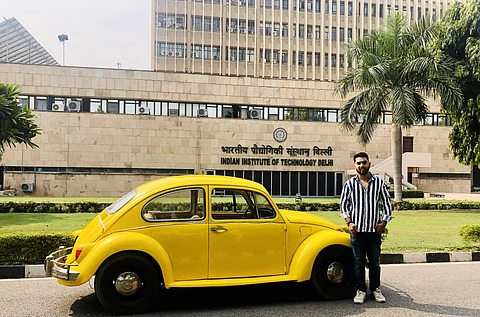

Owning a vintage car might make you feel like royalty but it was hardly practical. Mohammad Jawaad Khan, a 23-year-old engineer from Jammu's Chenab Valley promises to change that. He can turn any vintage car into an Electric Vehicle — no more oil guzzling engines, no more foraging for spare parts. The tech Jawaad uses is what he claims he invented by accident while working on a college project.
At a time when the government is also pushing for EVs and the automobile sector is also remodelling itself, Indian drivers are not all convinced by driving their car on electricity. While some complain of not having a manual gearbox, others miss the sound and feel of a car running on fossil fuels. But this is the alternative. There's no denying it. But when you drive an Austin 10 down the road, you would still feel like a king and drive it to the office every day. Obviously when the pandemic blows over.
But the first car Jawaad worked on was not an antique, but the cheapest one ever made — Tata Nano. "I started working on the project from my sixth semester and it took almost seven to eight months to complete. Everything fell into place I was shocked how such a small motor was giving us such good performance. And the accidental innovation was that I was able to retrofit the car without changing the gearbox and adding a differential to it," said Jawaad, a graduate of Punjab's Swami Vivekanand Institute of Engineering and Technology and now the Founder of Tadpole Projects. "I was invited to IIT Delhi in 2019 for an event where I met Arun Duggal, who had helped set up the Centre of Excellence for Research on Clean Air (CERCA) in IIT Delhi. He offered me to transform the 1948 Volkswagen Beetle at the IIT. I also went for an Electric Vehicle Course. But before We could start working on the car the first lockdown was imposed," he added. Jawaad accepts that he has learnt more on the job — be it about the right kind of motor to be used or how to fit it.
The Beatle was launched on February 6, 2021. But once all this was done. Jawaad didn't know what was next. "I was planning to get back to preparing for GATE. I come from a humble background. But the market reacted to the innovation and word spread like wildfire and within a few days, I got in touch with people from the industry who were interested. Over these few months we have a team of seven people at Tadpole Projects," he added. "I started with vintage cars but I never knew I was the first to retrofit one. One has to be very careful while handling these cars. The first challenge is that we cannot let the value of the car depreciate and the second is that there shouldn't be any performance issue either. People get in touch with us because we keep the cars intact but convert them to an EV. The one thing people like the most is that we retain the manual gearbox," he said.
But how is the performance? Does it still feel like you are driving a vintage? "Yes it does and without all the hassle," said Chaitanya Shashwat who owns an Austin 10 (1936). he loved Jawaad's work so much that he joined the start-up. Chaitanya is now a consultant and the Business Head of Tadpole Projects. "People like us who own one or two vintage cars and are not super-rich, can't really afford to maintain it regularly. My mechanic used to come from Jaipur to Delhi. Even if it's a job worth Rs 2000, I ended up paying Rs 15000 for it. Now I can easily take the car out for a spin any time I want. I can charge it and check how much it is charged and take it out. The joy is in the driving," he added.
While they are working on premium vintage cars and personal vehicles, Tadpole Projects are venturing into the commercial vehicle market as well and Chaitanya Shashwat thinks that might be the future. "The cabs run for 200 odd kilometres a day and they can easily charge the car for a considerable amount of time when they take a break," said Chaitanya. "We are getting into the business of converting, cars like EECO, Tata Ace and other Light Commercial Vehicles (LCV). This will bring down the pollution levels without adding more cars on the road," he added.
The major concern about EVs is the mileage. They use Lithium-Ion batteries and how long the car will run on one charge depends on how many batteries you are fitting inside your vehicle. "It can range from 80 km per charge to more than 300 km per charge," said Jawaad.
